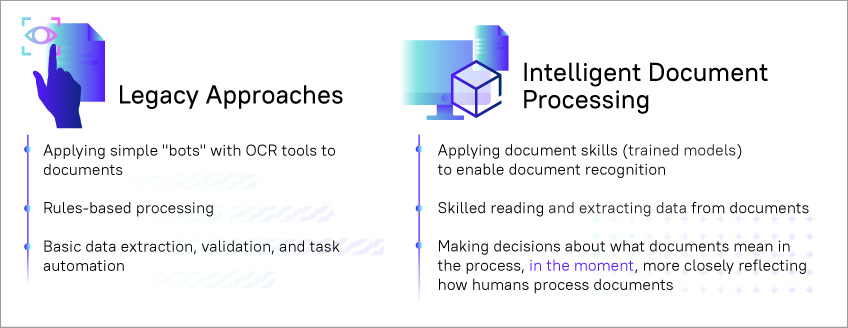What is Intelligent Process Automation?
June 03, 2022

What is Intelligent Process Automation (IPA)?
Intelligent Process Automation is grounded in the recognition that business processes have two main dimensions: the process itself and the data (typically found in documents) that fuels it. On the process side, it’s vital to understand how processes actually work, not just how they should work. And any successful approach to process automation would be incomplete without consideration of the documents that carry information from one step to the next.
Intelligent Process Automation leverages artificial intelligence (AI) and machine learning (ML) to bring together two powerful capabilities: Process Intelligence and Intelligent Document Processing.
Why is IPA important?
From the dawn of the digital age, businesses have been chasing the goal of true process automation—enabling machines to take on entire processes and freeing human workers to focus on more interesting, value-added pursuits. For a time, robotic process automation (RPA) appeared to hold the answer, but it failed to live up to its potential as a standalone solution. In a recent survey on intelligent automation, RPA proved to be the least-implemented solution over the past year.
Today, organizations seeking true process automation are finding the answer in an approach that’s both simpler and more complex: complex in its multifaceted nature, but simple for humans to implement and manage. Welcome to Intelligent Process Automation (IPA).
What are the capabilities of Intelligent Process Automation?
Process Intelligence
Process Intelligence, a combination of process mining and task mining, uses advanced algorithms to capture and analyze the time stamps in business applications to build a visual model of the process. This model makes it easy to identify any deviations from ideal process flows that could be costing time or money, impacting customer satisfaction, or raising compliance issues.
Organizations must understand processes before they can successfully implement process automation, and Process Intelligence delivers the real-world insights they need. They can address inefficiencies before devoting resources to automation, avoiding the common error of automating broken processes. They can also compare processes side-by-side to identify which ones are likely to yield the greatest ROI from automation.

After automation is in place, Process Intelligence enables continuous monitoring to flag deviations or inefficiencies as they arise, enabling businesses to address small problems before they become big ones.
Intelligent Document Processing
While many traditional approaches to process automation focused on data flows, most business processes are driven by documents—think invoices in accounts payable, loan applications in banking, patient records in healthcare, emails in customer service, etc. Without a way to analyze, understand, and process documents, process automation can yield only limited results.

Intelligent Document Processing (IDP) applies AI-based document processing “skills” to read and understand documents in a way that humans understand and manage content. As a result, the information contained in documents becomes immediately available and actionable, when and where it's needed, with little to no human intervention required. In addition to saving time and money, IDP reduces the risk of costly errors and frees employees to focus on more challenging work.
Intelligent Process Automation—why now?
As we mentioned earlier, the drive to automate is nothing new, but the onset of the COVID-19 pandemic forced organizations across industries to accelerate their automation initiatives. As digital analyst Brian Solis commented in CIO magazine, “COVID-19 pushed legacy processes […] well beyond peak capacity. They were also exposed for their inefficiencies and reliance on manual processing.”
As the initial shock of the pandemic faded and the economy began to recover, businesses faced a new challenge, commonly termed “the Great Resignation.” In the second half of 2021, more than 20 million Americans quit their jobs. When job-search site Indeed surveyed job changers on their reasons for quitting, 92 percent responded that "the pandemic made them feel life is too short to stay in a job they weren't passionate about." Suddenly, businesses have added incentives to retain their best talent. By taking on rote, repetitive tasks, automation enables employees to focus on more interesting work, creating a better overall employee experience and offering more reasons to stay in their jobs.
Over the last two years, businesses have faced ample incentives to light a fire under their automation journeys, and they wasted no time taking action. According to a recent survey, 98 percent of IT decision makers have implemented new automation technologies in the last two years, spurred by the pandemic. Better preparing the company to adapt to remote and hybrid working was the top cited reason for the change, followed by alleviating employee burnout and (somewhat surprisingly) pressure from employees to implement.
What's the difference between IPA and RPA?
There’s no question that robotic process automation paved the way for Intelligent Process Automation, and RPA remains a viable if limited solution. RPA is primarily a task-oriented approach, aiming to replicate human actions in accomplishing specific, rule-based tasks. RPA solutions cannot, however, understand content on their own, nor are they equipped to manage the complexities of end-to-end processes.

Intelligent Process Automation encompasses the “big picture” of business processes, applying AI technologies (e.g., Intelligent Document Processing, process mining, task mining, natural language processing, machine learning, advanced analytics) to mirror human decision-making at every stage. When and where relatively simple, rules-based decision-making is required, RPA can be an appropriate solution and may be used quite successfully. IPA capabilities allow you to scale RPA projects by expanding automation further.
What can Intelligent Process Automation do for businesses?
By combining the capabilities of Process Intelligence and Intelligent Document Processing, Intelligent Process Automation helps businesses understand processes before, during, and after automation. It identifies deviations or inefficiencies that can waste time and resources. This means businesses can use real-world data from their own operations to identify and prioritize processes most likely to benefit from automation. They also gain insight into how documents function as the basis for skilled decision-making at every stage of the process. These insights enable the business to determine how they can manage documents to make the process work more efficiently, and then apply the document skills needed to optimize content processing.
Which industries can benefit from Intelligent Process Automation?
Businesses across industries are leveraging Intelligent Process Automation to yield greater efficiency, lower risk of errors that can raise compliance issues, higher employee satisfaction, and more streamlined customer experiences.
-
Financial Services
IPA enables banks and financial institutions to uncover inefficiencies and reduce the risk of error in document-driven processes. Process automation in Financial Services can include customer onboarding, loan applications, and Know Your Customer (KYC) compliance procedures. -
Insurance
Documents drive a multitude of processes in the insurance industry, and many insurers are leveraging intelligent automation in Insurance to supplant manual tasks in underwriting, policy servicing, claim settlements, and many other areas. -
Healthcare
In hospitals and other healthcare organizations, AI and automation in healthcare is helping improve the patient experience in processes such as scheduling, billing, and clinical trial procedures. -
Transportation and logistics
Documents such as invoices, bills of lading, and receipts are at the heart of transportation and logistics processes, and IPA can help transporters improve efficiencies in data entry, order management, invoice processing, and other supply chain processes.
What does the IPA journey look like?
While earlier approaches to automation required significant infrastructure investments and dedicated teams of data scientists, implementing Intelligent Process Automation is relatively simple, and businesses can get up and running in a matter of weeks. Once the basic building blocks are in place, the organization can follow a few simple steps to achieve their IPA goals:
- Analyze processes as they actually execute to evaluate where they are working well and where inefficiencies occur
- Understand the big picture of how data drives the process, with an emphasis on how unstructured data from documents fuels the process.
- Intelligently automate where it makes sense, prioritizing processes that offer the greatest potential ROI from automation
- Automate monitoring of results to enable continuous improvement.
The future of process automation is intelligent
By blending the unique capabilities of Process Intelligence and Intelligent Document Processing, Intelligent Process Automation (IPA) is ushering in a new era for business processes optimization. Organizations seeking to bridge the gaps encountered in earlier approaches and tap into the full power of AI are uncovering new possibilities—without having to make huge infrastructure investments or hire entire teams of data scientists.
Find out how ABBYY Intelligent Process Automation solutions can address your needs.
